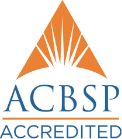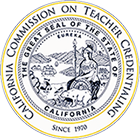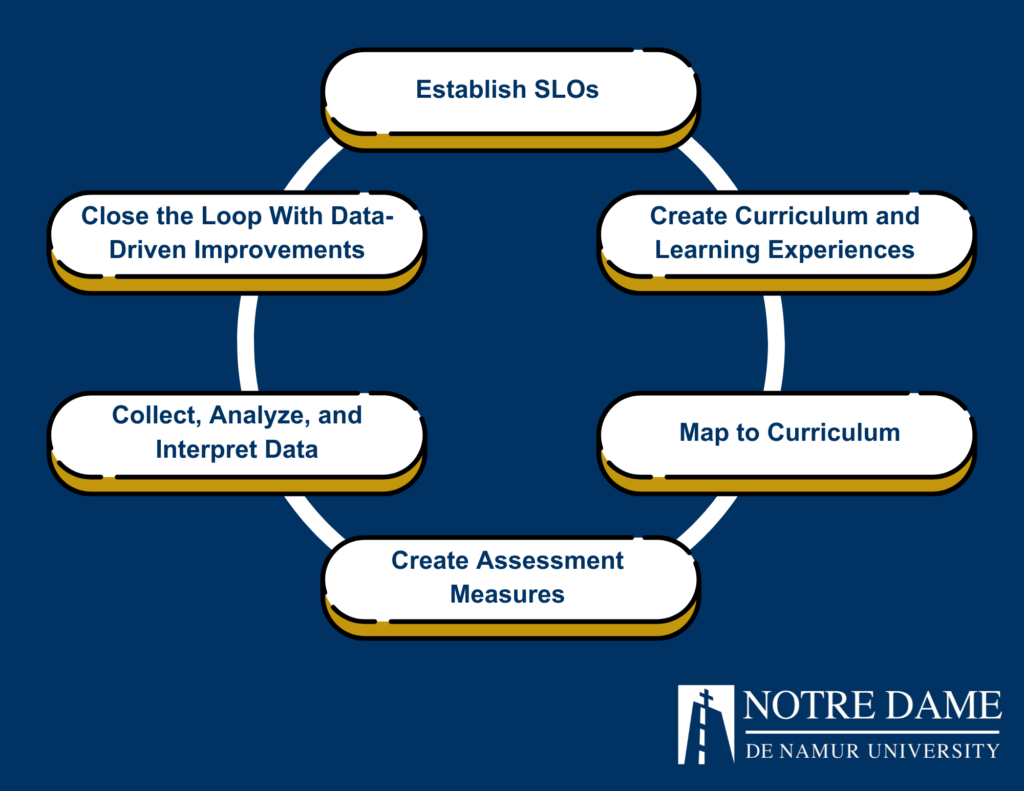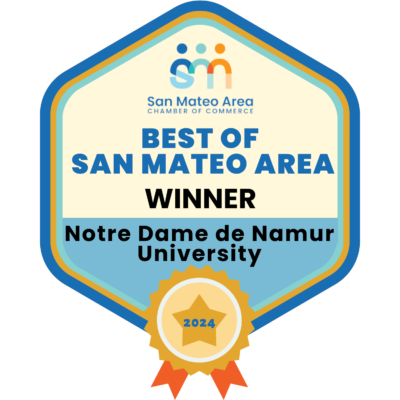Accreditation
The Sisters of Notre Dame de Namur founded the Academy of Notre Dame in 1851 in San Jose, California. The institution was chartered by the State of California in 1868 as College of Notre Dame and moved to Belmont, CA in 1923. The institution changed its name to Notre Dame de Namur University (NDNU) in 2001.
Notre Dame de Namur University is an accredited, independent Catholic, coeducational, master’s university offering graduate, credential, and undergraduate degree completion programs. WSCUC (formerly WASC) has continuously accredited NDNU since 1955.
Institutional Accreditation
Notre Dame de Namur University is accredited by the:
WASC Senior College and University Commission (WSCUC)
1001 Marina Village Parkway, Suite 402
Alameda, CA 94501
510-748-9001
www.wscuc.org
Accreditation Liaison Officer: Dr. Gregory Zubacz, Associate Provost
Read the most recent Commission action letter (March 2024) and the associated Visiting Team report (December 2023).
WSCUC Reaccreditation Site Visit scheduled for September 10-12, 2025
Accredited and Approved Programs at NDNU
Education credential programs are accredited by the California Commission on Teacher Credentialing. Per Federal Regulation 34 CR 668.43 (a)(5)(v)(A-C), NDNU has not determined whether these programs meet the licensure requirements in the other 49 states.
MS Clinical Psychology program with the Marriage and Family Therapy concentration (MSCP/MFT), or with the Marriage and Family Therapy and Licensed Professional Clinical Counseling concentration (MSCP/MFT/LPCC), is in compliance with the California Board of Behavioral Sciences requirements for programs leading to MFT licensure (MSCP/MFT), or to both MFT and LPCC licensure (MSCP/MFT/LPCC). Per Federal Regulation 34 CR 668.43 (a)(5)(v)(A-C), NDNU has not determined whether these programs meet the licensure requirements in the other 49 states.
The Accreditation Council for Business Schools and Programs (ACBSP) accredits the following business programs at Notre Dame de Namur University:
Master of Business Administration (MBA); and Master of Public Administration (MPA).
State Authorization for Online Programs
The Department of Education requires that institutions offering online or distance learning programs outside of their home states must seek authorization to operate from regulatory bodies in those states. Each state has a different set of requirements when it comes to allowing out-of-state colleges and universities to offer online degree programs to its residents. Notre Dame de Namur University complies with such requirements and is working to increase the number of states where we can offer online programs. Notre Dame de Namur University currently welcomes applications to our online programs from residents from the following states:
Assessment
Assessment Leadership at NDNU
Assessment and Program Review at NDNU is led by the Assessment Council which is comprised of designated members of all schools and chaired by the Associate Provost. The Council is advisory to the Provost. The overall charge of the Assessment Council is to foster an understanding of assessment and its important role in a learning-centered university and to encourage assessment practices that contribute to the improvement of student learning and institutional effectiveness. The Assessment Council supports NDNU faculty who are responsible for creating and evaluating student learning outcomes and establishing standards of student performance.
The Assessment Council serves as a resource for improving academic (curricular and co-curricular) assessment processes at NDNU for the purpose of enhancement and documentation of student learning outcomes. The Assessment Council also serves as the steward for the assessment of institutional outcomes. It operates in accordance with the values of the Hallmarks of NDNU as a learning community and is guided by the principle of assessment as a means for improvement of the quality of student learning/success and institutional effectiveness.
Learning Outcomes
NDNU has developed learning outcomes at the program level which also reflect the requirements of external accreditors. Each program’s learning outcomes are included with the description of the program in the NDNU Catalog.
The Assessment Cycle at NDNU
The Assessment Cycle in the School of Education
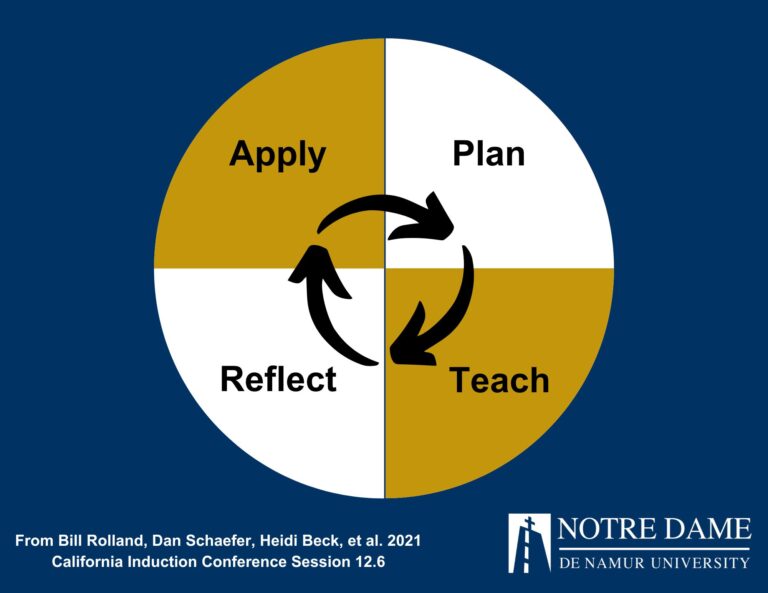
CTC Framework:
Continuous improvement for all teachers is based on the “Cycle of Formative Assessment”
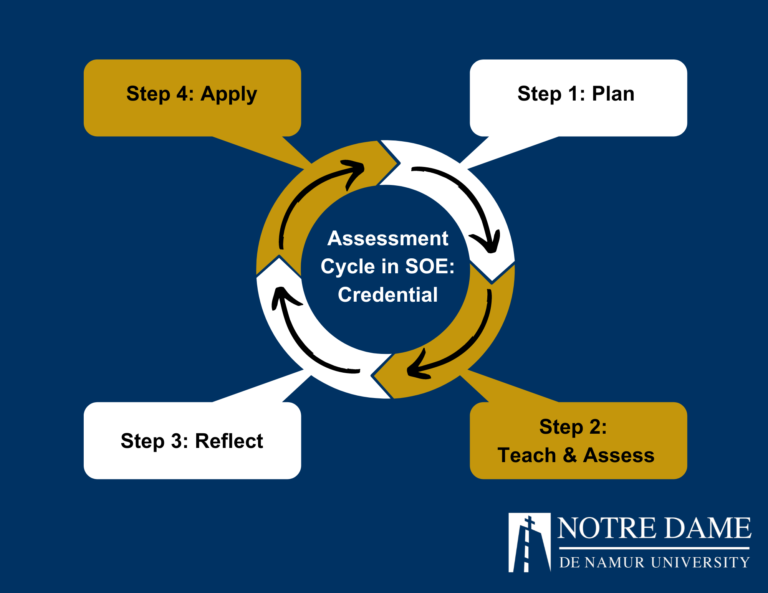
Faculty prepare the academic year with these Professional Development activities:
- CalTPA Mapping to align courses with particular CalTPA Cycle and step(s)
- MSCRED Methods Course Articulation aligning scores to MSCRED in preparation for Literacy Standard (TPE 7)
- Student Teacher Orientation, preparing teacher candidates with these resources and live in-person/hybrid orientation preparation for teaching practicum
- Course syllabi includes alignment with Teacher Performance and CalTPA objectives
During the school year, teacher candidates complete their coursework and conduct the following with NDNU faculty and mentors:
- Supervisor Observation Notes and Evaluation Forms. Supervisors, Adjunct Faculty, and Cooperating Teachers use these forms during observations and assessment of their teacher candidates
- Submit CalTPA In addition to completing coursework, teacher candidates also submit their TPA to Commission Teacher Credentialing for scoring.
During our SOE Retreat, faculty observe, analyze, and discuss the following assessments:
Formative assessment: Faculty meet to plan and engage in improved practices for the coming year. Examples:
- CalTPA Questions- For Univ Supervisors Handout for University Supervisors to ask and debrief with their teacher candidates Cal-TPA aligned questions
- Improved Lesson Plan for teacher candidates, based on the areas that teacher candidates should improve on
Academic Program Review
The Academic Program Review (APR) process at Notre Dame de Namur University is a key method for evaluating the effectiveness of academic programs in promoting student achievement, with all programs reviewed on a cycle not exceeding six years. This review includes all baccalaureate and master’s degrees, post-baccalaureate credentials, and general education. Self-study documents must be timely, comprehensive, reflective, and evaluative, focusing on assessing student learning objectives and using results to improve program quality. The self-study aligns with annual assessments, and external reviewers are required for programs without specialized accreditation.
